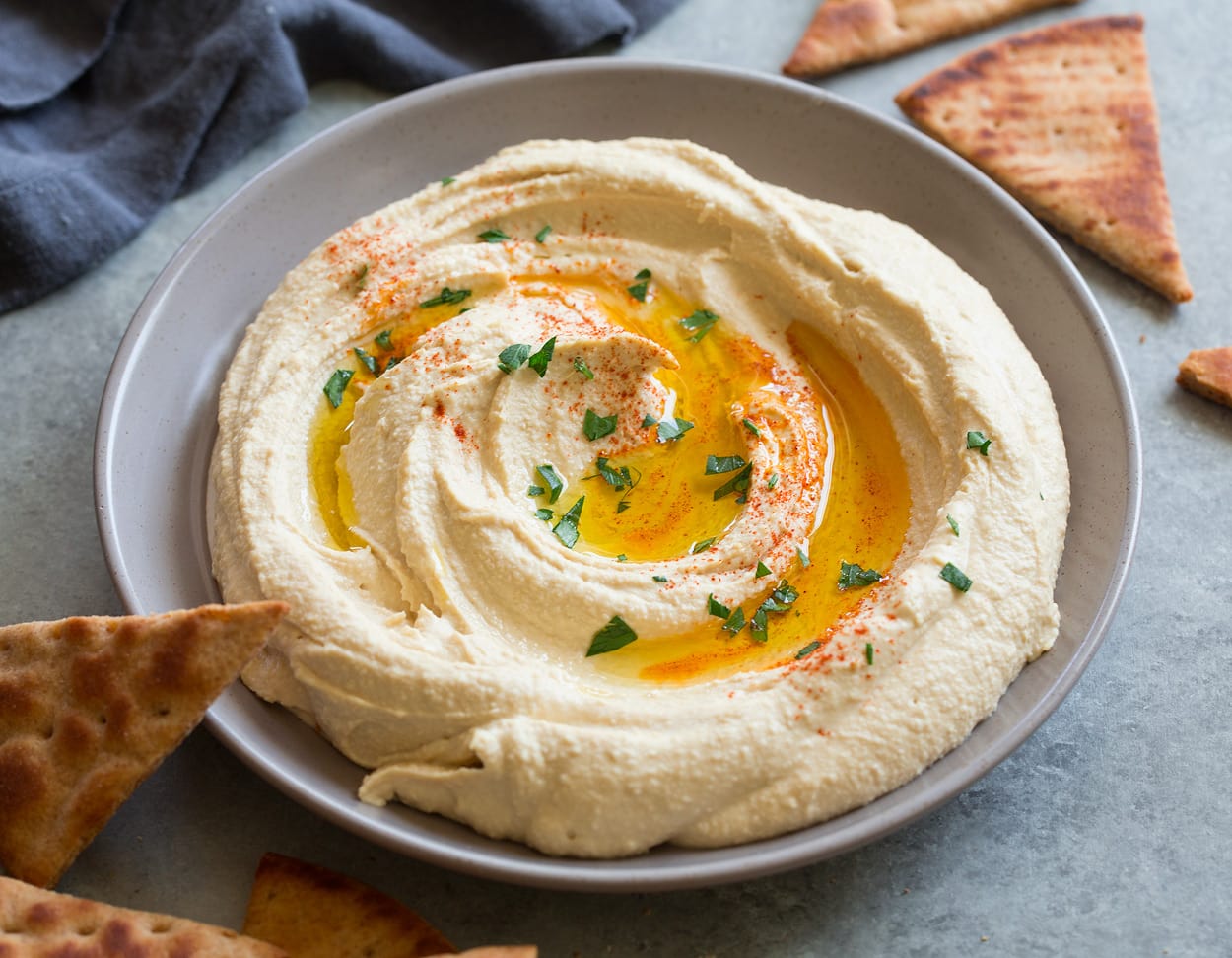Is Hummus Healthy? 5 Great Reasons to Eat More Hummus

- Hummus is an incredibly popular Middle Eastern dip and spread.
- It is typically made by blending chickpeas (garbanzo beans), tahini (ground sesame seeds), olive oil, lemon juice and garlic in a food processor.
- Not only is hummus delicious, but it is also versatile, packed with nutrients and has been linked to many impressive health and nutritional benefits
Here Are 5 Scientifically Proven Benefits Of Hummus.
1. Super Nutritious and Packed With Plant-Based Protein
You can feel good about eating hummus, as it contains a wide variety of vitamins and minerals.
Contents
A 100-gram (3.5-ounce) serving of hummus provides :
- Calories: 166
- Fat: 9.6 grams
- Protein: 7.9 grams
- Carbs: 14.3 grams
- Fiber: 6.0 grams
- Manganese: 39% of the RDI
- Copper: 26% of the RDI
- Folate: 21% of the RDI
- Magnesium: 18% of the RDI
- Phosphorus: 18% of the RDI
- Iron: 14% of the RDI
- Zinc: 12% of the RDI
- Thiamin: 12% of the RDI
- Vitamin B6: 10% of the RDI
- Potassium: 7% of the RDI
Hummus is a great source of plant-based protein, providing 7.9 grams per serving.
This makes it an excellent option for people on a vegetarian or vegan diet. Consuming enough protein is essential for optimal growth, recovery and immune function.
In addition, hummus includes iron, folate, phosphorus and B vitamins, all of which are important for vegetarians and vegans, as they may not get enough from their diet.
SUMMARY
Hummus provides a wide variety of vitamins and minerals. It is also a great plant-based source of protein, which makes it a nutritious option for vegans and vegetarians.
2. Rich in Ingredients Proven to Help Fight Inflammation
- Inflammation is the body’s way to protect itself from infection, illness or injury.
- Hummus contains chickpeas, olive oil and sesame seeds (tahini), which are proven to have anti-inflammatory properties
https://bestipsdaily.com/8-reasons-why-you-are-not-losing-weight/
3. High in Fiber That Promotes Digestive Health and Feeds Your Good Gut Bacteria
- Hummus is a great source of dietary fiber, which can improve digestive health.
- It provides 6 grams of dietary fiber per 3.5 ounces (100 grams), which is equal to 24% of the daily fiber recommendation for women and 16% for men
- Hummus is a great source of fiber, which can help keep you regular. Additionally, fiber can promote the growth of healthy gut bacteria, which convert fiber into butyrate — a type of fatty acid that helps nourish cells in the gut.
4. Contains Heart-Healthy Ingredients That May Reduce Heart Disease Risk
- Heart disease is responsible for 1 in every 4 deaths worldwide
- Hummus contains several ingredients that may help reduce risk factors for heart disease.
- Hummus contains chickpeas and olive oil — two ingredients that may reduce risk factors, and thus overall risk, for heart disease.
Reasons to Eat More Hummus
5. Promotes Weight Loss and Helps You Maintain a Healthy Body Weight
- Several studies have examined how hummus affects weight loss and maintenance.
- Interestingly, according to a national survey, people who regularly consumed chickpeas or hummus were 53% less likely to be obese.
- Hummus is a great source of fiber and protein, which may promote weight loss. Surveys have shown that people who consume chickpeas or hummus regularly are less likely to be obese, plus have a lower BMI and smaller waist circumference.
Although Hummus Is Widely Available In Supermarkets, It’S Incredibly Easy To Make At Home.
The entire process takes under 10 minutes and only requires a food processor.
How to Make Hummus
- Homemade varieties will generally last anywhere from 3-4 days, whereas store-bought brands generally lasts 6-7 days after opening.
- These estimates assume that it maintains a refrigerated temperature; as we mentioned already, the shelf life of hummus is diminished greatly if it does not remain chilled.
Ingredients For Making Hummus
- 2 cups of canned chickpeas (garbanzo beans), drained
- 1/3 cup of tahini
- 1/4 cup of lemon juice
- 1 tablespoon of olive oil
- 2 garlic cloves, crushed
- A pinch of salt
Steps Of Making Hummus
- Place the ingredients into a food processor and blend until smooth.
- Enjoy on wraps, sandwiches or as a tasty dip.
Side Effects Of Hummus
Nutritionist Heather Hanks told the online food publication in February that eating hummus in excess can cause gastrointestinal inflammation.
This is because it got chickpeas, sesame paste (tahini), garlic, and olive oil in most traditional versions.
In her own words: “Hummus is made from chickpeas, which are a legume. These can be hard to digest for many people, and induce GI inflammation.”
BOTTOM LINE
Hummus is nutritious, versatile and very easy to make. Simply add the ingredients above into a food processor and blend until smooth.

